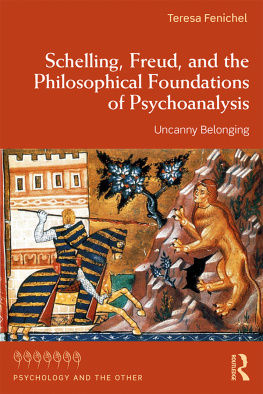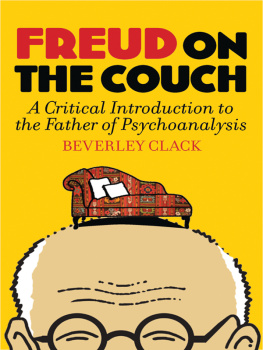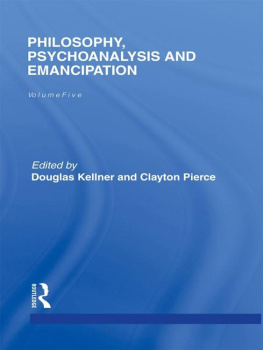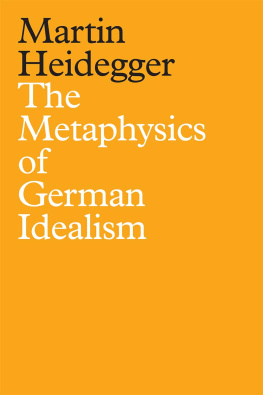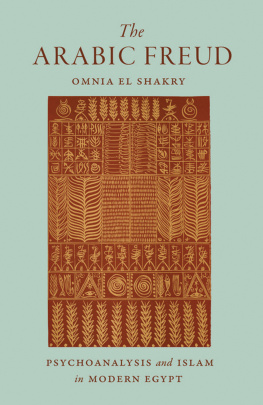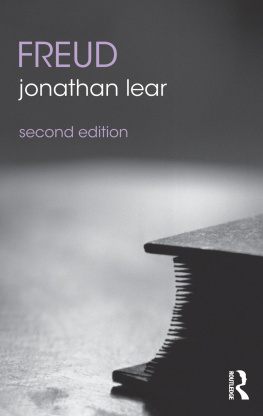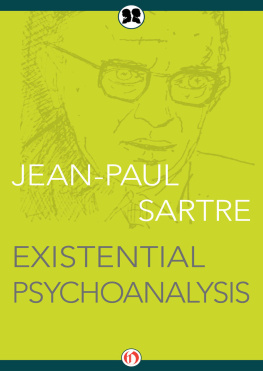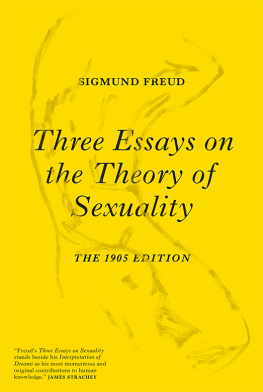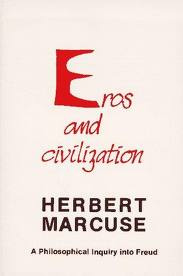Table of Contents
Pages
This book is a highly compelling study of Freud and Schelling in search of the philosophical soul of psychoanalysis and the psychoanalytic heart of philosophy. Freuds declared scientism veils an approach in which reality engages with the world necessarily by way of fantasy; Schellings philosophy implies that we can know reality, which includes ourselves, only through an engagement with its strange uncanniness. In this beautifully written book, Fenichel reveals a new way to make philosophy and psychoanalysis converse.
Russell Grigg, author of Lacan, Language and Philosophy
If nihilism, as Nietzsche stated, is the uncanniest of guests, it is so not because it unveils the uncanny but because it covers it over, even to the point of dissolving it completely with the help of one benzodiazepine or the other, the pharmaceutical take on modernitys distinctive blend of dull everydayness and the self-evidence of reason. This bold and ambitious book represents Teresa Fenichels gritty determination to combat nihilism by rehabilitating the oldest but most difficult form of therapy. Championed by practitioners from Freud to Julia Kristeva, it can be characterized as the simple resolve to live in the truth, and above all in the truth of truths flaming center, the sheer uncanny fact that being is. That truth is what is at issue here is the justification for Fenichels decision to interpret Freudian psychoanalysis through the lens of Schellings metaphysics of the unconscious. Uncanny truth is not, however, the last word, for the mystery of life is that it brings with it the possibility of an uncanny belonging. Just as we belong to one another in love, we belong to everything that exists in the shared fragility of a mortality that is always a blessing and a curse.
Joseph P. Lawrence, author of Schellings Philosophie desewigen Anfangs
Schelling, Freud, and the Philosophical Foundations of Psychoanalysis
Schelling, Freud, and the Philosophical Foundations of Psychoanalysis provides a long-overdue dialogue between two seminal thinkers, Schelling and Freud. Through a sustained reading of the sublime, mythology, the uncanny, and freedom, this book provokes the reader to retrieve and revive the shared roots of philosophy and psychoanalysis.
Teresa Fenichel examines the philosophical basis for the concepts of the unconscious and for the nature of human freedom on which psychoanalysis rests. Drawing on the work of German philosopher F. W. J. Schelling, the author explores how his philosophical understanding of human actions, based as it was on the ideas of drives, informed and helped shape Freuds work. Fenichel also stresses the philosophical weight of Freudian psychoanalysis, specifically in regards to the problem of freedom and argues that psychoanalysis complicates and reinforces Schellings basic idea: to know reality we must engage with the world empathetically and intimately.
This book also serves as an introduction to Schellings thought, arguing that his metaphysicsparticularly concerning the primacy of the unconscious and of fantasycan be read as a therapeutic endeavor. Finally, the book offers a deep rethinking of the action and nature of sublimation through both Freuds and Schellings texts. Fenichel suggests psychoanalytic therapy is self-interpretationa recognition of our narratives as narratives, without for that reason taking them any less seriously.
Schelling, Freud, and the Philosophical Foundations of Psychoanalysis will be of great interest to psychoanalysts and psychoanalytic psychotherapists as well as scholars of philosophy.
Teresa Fenichel is a visiting assistant professor at the College of the Holy Cross in Worcester, MA, USA. Her research interests include German idealism, psychoanalysis, feminist philosophy, and aesthetics.
The Psychology and the Other Book Series
The Psychology and the Other Book Series highlights creative work at the intersections between psychology and the vast array of disciplines relevant to the human psyche. The interdisciplinary focus of this series brings psychology into conversation with continental philosophy, psychoanalysis, religious studies, anthropology, sociology, and social/critical theory. The cross-fertilization of theory and practice, encompassing such a range of perspectives, encourages the exploration of alternative paradigms and newly articulated vocabularies that speak to human identity, freedom, and suffering. Thus, we are encouraged to reimagine our encounters with difference, our notions of the other, and what constitutes therapeutic modalities.
The study and practices of mental health practitioners, psychoanalysts, and scholars in the humanities will be sharpened, enhanced, and illuminated by these vibrant conversations, representing pluralistic methods of inquiry, including those typically identified as psychoanalytic, humanistic, qualitative, phenomenological, or existential.
For a full list of titles in the series, please visit the Routledge website at: www.routledge.com/Psychology-and-the-Other/book-series/PSYOTH
Schelling, Freud, and the Philosophical Foundations of Psychoanalysis
Uncanny Belonging
Teresa Fenichel

First published 2019
by Routledge
2 Park Square, Milton Park, Abingdon, Oxon OX14 4RN
and by Routledge
711 Third Avenue, New York, NY 10017
Routledge is an imprint of the Taylor & Francis Group, an informa business
2019 Teresa Fenichel
The right of Teresa Fenichel to be identified as author of this work has been asserted by her in accordance with sections 77 and 78 of the Copyright, Designs and Patents Act 1988.
All rights reserved. No part of this book may be reprinted or reproduced or utilized in any form or by any electronic, mechanical, or other means, now known or hereafter invented, including photocopying and recording, or in any information storage or retrieval system, without permission in writing from the publishers.
Trademark notice: Product or corporate names may be trademarks or registered trademarks, and are used only for identification and explanation without intent to infringe.
British Library Cataloguing-in-Publication Data
A catalogue record for this book is available from the British Library
Library of Congress Cataloging-in-Publication Data
Names: Fenichel, Teresa, 1981- author.
Title: Schelling, Freud, and the philosophical foundations of psychoanalysis : uncanny belonging / Teresa Fenichel.
Description: Abingdon, Oxon ; New York, NY : Routledge, 2019. | Includes bibliographical references and index.
Identifiers: LCCN 2018026265 (print) | LCCN 2018027975 (ebook) | ISBN 9781351180153 (Master) | ISBN 9781351180146 (Web PDF) | ISBN 9781351180139 (ePub) | ISBN 9781351180122 (Mobipocket/Kindle) | ISBN 9780815385813 (hardback : alk. paper) | ISBN 9780815385837 (pbk. : alk. paper)
Subjects: LCSH: Psychoanalysis and philosophy. | PsychoanalysisPhilosophy. |
Schelling, Friedrich Wilhelm Joseph von, 1775-1854. | Freud, Sigmund, 1856-1939.
Classification: LCC BF175.4.P45 (ebook) | LCC BF175.4.P45 F45 2019 (print)
| DDC 150.19/5dc23
LC record available at https://lccn.loc.gov/2018026265
ISBN: 978-0-8153-8581-3 (hbk)
ISBN: 978-0-8153-8583-7 (pbk)
ISBN: 978-1-351-18015-3 (ebk)
Typeset in Times New Roman

